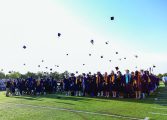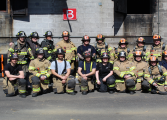By Page H. Gifford
Correspondent
Many residents of Fluvanna County are taking the fallout from COVID-19 in stride while others are fighting the loneliness of social distancing or just missing ordinary life.
One older woman misses her card games, helping at Bingo, and socializing with her friends. She is alone, trying to find ways to mitigate her isolation with other thoughts, keeping hope alive.
There are many people that live alone, trying to find ways to survive in a world that is always connected socially through devices but now realizing that real face-time and hugs are far more meaningful. But technology has given us a way to stay connected at a time when we can’t see each other in person. Skype and Facebook are the only connections one may have to survive isolation.
Some Fluvanna residents see this as bringing us closer together. “I think the outcome of this crisis will be different for different people. Some will become more socially isolated and some will appreciate social contact more and make more of an effort to maintain contact as a result of the isolation they experienced as a result of the social distancing,” said George Gaige.
The many comments were enlightening and thought-provoking and were not unrelated to what some experts are saying could happen as a result of this crisis. Most Fluvannians agree on one thing: that like all Americans we have endured numerous life-changing events throughout the generations, from the Civil War to the pandemic of 1918, to the Depression, W.W. II, Kennedy’s assassination, 9/11, and the Great Recession of 2008.
“I think we are pretty darn resilient and will get through this,” said Deborah Nixon. Experts agree, we will get through this but this event like past events will re-shape society.
Sandra Uribe sums it up best.
“Let’s hope that we learn to appreciate what we have, that we realize that we can get along just fine with less, that we recognize the importance of listening to each other, caring for each other and demanding our rights. Let’s hope that we recognize that science and facts must guide decision making from now on. After being home-bound we should all be ready to become involved in our communities. I love this quote from Margaret Mead: ‘Never doubt that a small group of thoughtful committed citizens can change the world: indeed it’s the only thing that ever has.’ ”
Sociologists predict there will be a decline in polarization as a result of major events like this one. Events like these destabilize lasting relational patterns. The belief is that given the current social climate of racial tension and gender bias, this will be a positive turning point in our cultural and political discourse, but it will take time.
Experts predict less individualism and more public involvement for the greater good and of utilizing technology for community outreach. There will be changes in the role of government and how we worship. Probably one of the largest changes this pandemic has forced us into is the stark realization our healthcare system, particularly public health, is at risk.
“The public health system is broken, I hope this will bring reform,” said Jerry Patchen, a former public health employee. There is evidence to support his statement that most plagues reveal flaws in the public health systems and require reform.
This will not only fix the public healthcare problem but also revolutionize standard healthcare through telemedicine. The house call may be a thing of the past but it’s coming back into vogue via the remote office visit. This is not new. Doctors and healthcare providers have been using this technology for the housebound and other patients with disabilities who have difficulties getting to appointments. This along with the traveling nurses and virtual house-calls can lessen travel time in rural areas and time spent waiting in doctor’s offices, leaving physicians with more time spent with patients who need critical care. This will help to make the doctor’s or nurse practitioner’s time more efficient.
This also leads to what is already known about our fractured healthcare system; a 40-year failed market-based system with costly inefficient development, research, and manufacturing of medicines and vaccines.
“We need to stop importing the ingredients we need for medicine from China,” said Owen Edgerton. He opts for a stronger domestic supply chain.
Science will have a new respect, say experts. Artist Tom Tartaglino wishes for a kinder, gentler world but sees hope for global warming on many fronts.
“We have seen how the skies have cleared over China, once they ceased production.” There is new hope for our environment. Predictions have the government becoming stronger and more centralized, revitalizing public trust in institutions. But there is the public factor, that people will find ways to help their communities, not only in crisis but in ways to make systems more efficient in the future. Sharon Harris is already helping and working with others, using technology to create networks and connections and rallying to respond to the needs of others.
“Two weeks ago, after seeing what Charlottesville was doing with mutual aid initiatives, and after talking with a friend, I started a Facebook group to connect neighbors in need with area resources. As of today, there are 600 members. People post about the needs they have, the resources they know about or want to find. MACAA folks post needs for specific donations. Announcements are made when schools distribute food to students,” said Harris. “It’s really a community connection and not run by any one person or organization but a hub to share info. From that, the kids and I created a website and spreadsheet where people can look for resources or places to donate.”
Online teaching has come into view as a result. This has been partially used in community colleges and by universities for those students who are taking post-graduate or continuing education courses. But now, everyone sees it as an experimental revolution, an option for homeschooling as well as an enhancement for regular classroom teaching. This idea intrigues Michael Jordan.
“I think we’ll see college students taking more classes online, public school students taking college-level courses, or homework online, it may also put more stringent control on homeschooling.” He sees potential as well as a money-saving advantage but knows there is a lot of work to be done on that front. This is already one of the areas that has some infrastructure in place and the idea is growing but so will the technological advances that have to be made, including broadband access for everyone, everywhere.
“A sad reality is that not everyone in the county has internet access so we can’t reach some who may have the greatest needs. And, while people are rallying to help and donate, and there are some services in place, this situation points to some glaring lacks and gaps in service in the county,” said Harris. “My hope and prayer is that once things settle down, people will remember the needs and advocate for systemic change.”
Jordan also sees an end to brick and mortar stores and malls unless they redefine themselves in some other way.
“The way we shop, we are shopping more online and dining at restaurants may mean more eating at home and take-out.” Experts support Jordan, also stating there may be fewer dine-in restaurants as the population turns away from communal living. Cafes and take-out may become the norm.
“This means a permanent loss of jobs,” said Jordan. Who will be needed? That is the question in the new economy.
“We will go into a lengthy economic depression. It will be difficult for young people, or anyone, to find a job. The enormous amount of the financial rescue package will make it more expensive for our government to borrow in the future, exacerbating our national debt. The reduced respect we have in the world may never be restored due to our lack of responsible leadership,” said Florence Buckholz.
“Don’t forget the impact the corona virus has had on local rescues,” said Jackie Meyers of Peaceful Passings. Animal shelters are struggling because donations may be down but fostering and adoptions are up everywhere.
“I have many stepping forward to foster,” said Mary Birkholz of Caring for Creatures.
Michael Jordan added, “Events like this, World War II, have already accelerated change.”
Teacher and artist Margie Kirtizer stated “I would stick to the spirit of togetherness. I have seen a serious uptick in customer service in the few places I’ve gone. I’d stay away from too much political assertions as they will remain polarizing and viewed through the same political lenses. This virus is apolitical and we’re better off trying to fight it together. There are no winners if we lose.”




